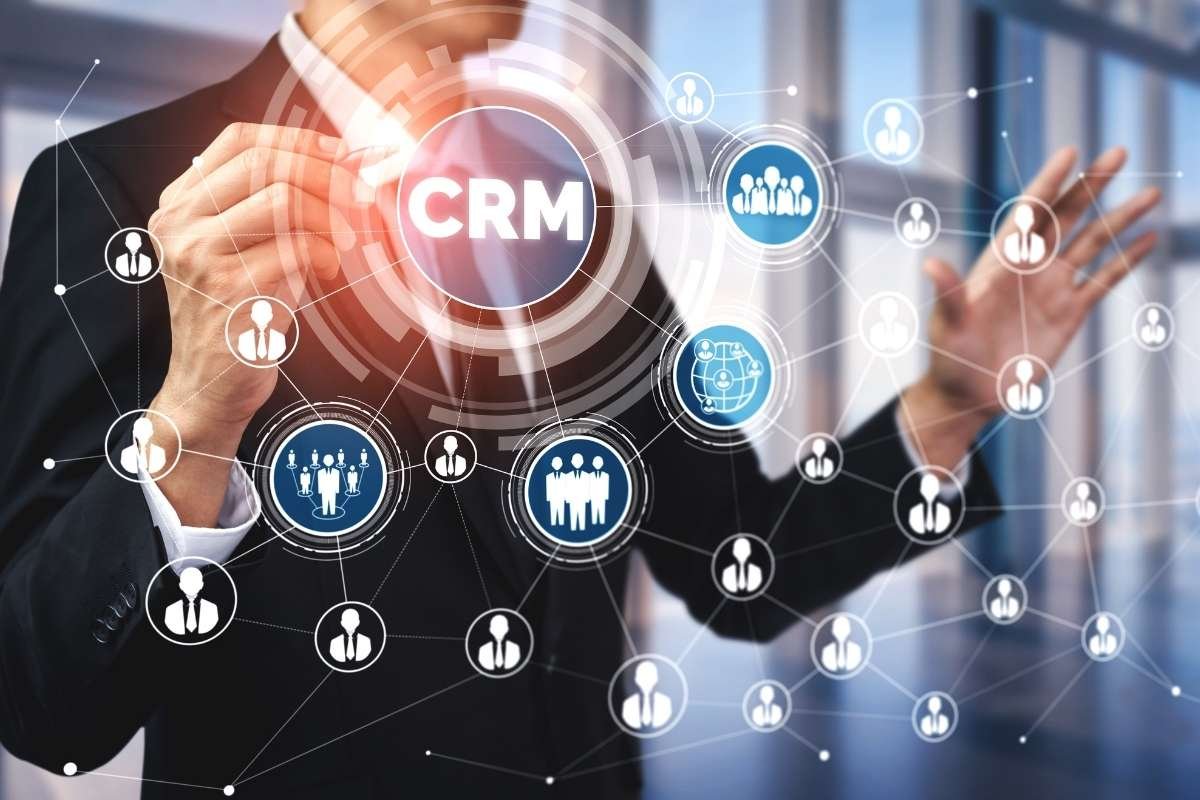In today’s hyper-competitive talent acquisition environment. The conventional hiring methods are long gone. Gone are the days of shortlisting through countless spreadsheets and email trails. There is a new and more strategic approach in view. The secret weapon? A strong CRM. But these are not about managing customers. They are about managing the most valuable asset a company has, its future employees.
The best recruiting CRM software is not just a regular database. Moreover, it is the lifeblood of a modern hiring strategy. It has the potential to take your hiring process to the next level. It improves efficiencies, creates an easy candidate experience, and saves you significant money. This is the difference between a reactive and chaotic hiring process. This is a proactive and relational process. It helps in bringing in top talent before they consider going elsewhere.
But which one does this? In this article, we will reveal the Best Recruiting CRM Software in 2025. So, you can see the tools that are changing how companies hire.
What is Recruiting CRM Software?
Recruiting CRM software serves as a centralized system. It helps in building and maintaining relationships with candidates. Also, organize their data and facilitate proactive recruitment strategies. With the help of talent pools and personalized outreach.
This software solution changes the way companies attract and engage talent. It’s the single source of truth for candidate data. It also tells what’s on their resumes for every conversation you’ve ever had with them. Compared to the traditional way of recruiting. A CRM lets you build, manage, and engage a thriving talent pool. Through personalized and automated communications. It shifts hiring from a transaction-based to a relationship-based interaction. This improves the candidate experience and increases efficiency.
Why Businesses Need the Best Recruiting CRM Software in 2025?
In the 2025 competitive talent market. Attracting and retaining top talent requires proactive engagement and efficient processes. The best recruiting CRM software empowers businesses to build lasting candidate relationships. By using automation and analytics. This improves both the recruiter and candidate experience. And also keeps the organizations ahead of their competition.
Here are some reasons for adopting recruiting CRM:
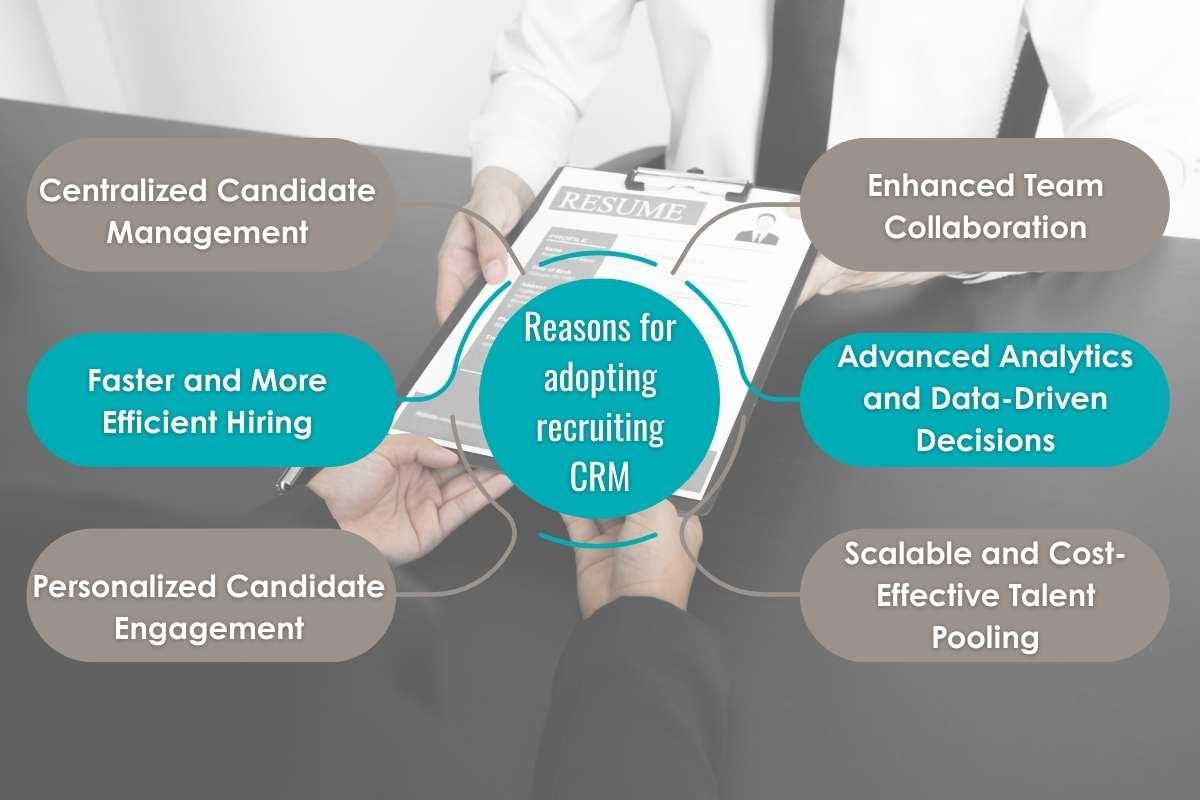
1. Centralized Candidate Management
The Best Recruiting CRM software provides a single platform. To store and manage all candidate information. It also offers communication history and documentation. This eliminates the confusion of scattered tools and spreadsheets. This helps prepare businesses for future hiring needs.
2. Faster and More Efficient Hiring
Automation of repetitive tasks, such as scheduling interviews and sending follow-up emails. It also reduces time-to-fill by up to 40% and enables recruitment teams to focus on more strategic work.
3. Personalized Candidate Engagement
CRM tools allow for customized communication and automated outreach. It significantly improves candidate satisfaction and ensures timely updates. It increases offer acceptance rates and strengthens employer branding.
4. Enhanced Team Collaboration
The best CRM systems enable seamless sharing of candidate profiles. Along with hiring stages and feedback. It also keeps large or distributed hiring teams aligned and reduces duplicate efforts.
5. Advanced Analytics and Data-Driven Decisions
Modern CRM software includes analytics features. This track metrics like time-to-hire, candidate engagement, and recruiting source effectiveness. This allows businesses to make informed decisions and continuously improve hiring strategies.
6. Scalable and Cost-Effective Talent Pooling
Recruiting CRMs maintain pools of qualified candidates. It helps in ensuring companies do not have to start from scratch for each new vacancy. This long-term pipeline building is cost-effective. And supports business growth, whether the need is to hire a handful or hundreds of employees.
30 Best Recruiting CRM Software Solution in 2025
To simplify your search for the perfect tool. Here is a curated list of the 30 best recruiting CRM software on the market. These platforms are designed to streamline your talent acquisition process. It also helps you build lasting candidate relationships:
1. iSmartRecruit
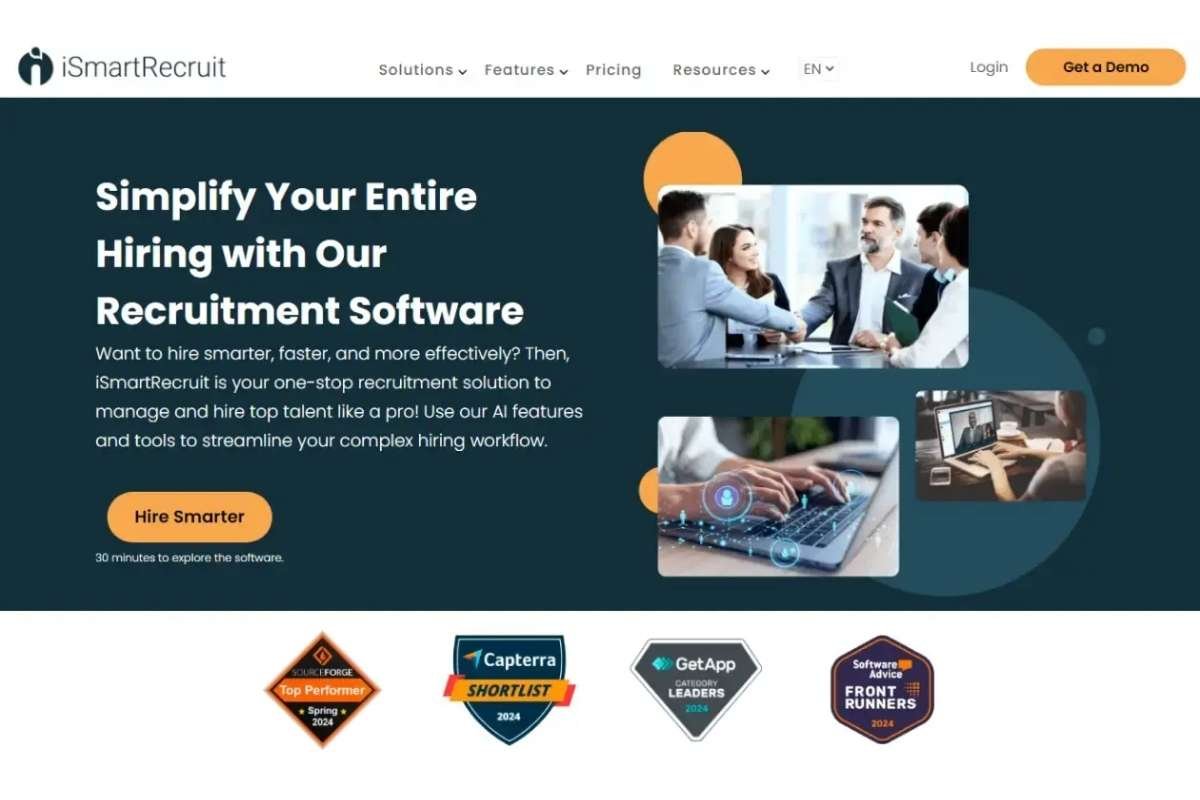
iSmartRecruit is a flexible, cloud-based AI-powered ATS and CRM. It is used by over 10,000 users across 70+ countries. It offers multilingual support and streamlines recruitment. Such as sourcing and onboarding through automation and intuitive workflows.
- Benefits: User-friendly and highly customizable; offers end-to-end recruitment management; great value for money.
- Limitations: Pricing details aren’t transparent. Generally, “quote upon request”, and frequent updates may require adaptability.
- Best for: Small to medium-sized staffing firms. And HR teams are seeking a customizable, multilingual CRM/ATS solution.
- Key Features: AI resume parsing, applicant tracking, recruiting CRM, multilingual support, automation. With job and candidate dashboards.
- Pricing Tier: Not publicly listed; likely “contact for pricing” structure.
2. Greenhouse
Description:
Greenhouse is a leading ATS and the best recruiting CRM software. It is designed to improve structured hiring, collaboration, and candidate experience. It’s trusted by enterprises and fast-growing companies for its scalable, data-driven workflows.
- Benefits: Strong focus on structured hiring, excellent integrations. It is analytics-driven and scalable for large teams.
- Limitations: Steeper learning curve; pricing is on the higher side.
- Best for: Mid to large enterprises seeking advanced recruiting workflows and analytics.
- Key Features: AI resume parsing, applicant tracking, recruiting CRM. With multilingual support, automation, job, and candidate dashboards.
- Pricing Tier: Quote-based; tailored to business size and hiring needs.
3. Zoho Recruit
Zoho Recruit is a cloud-based ATS with CRM functionality. It is ideal for both staffing agencies and corporate HR teams. It supports the full hiring cycle. This includes candidate sourcing, job posting, interview tracking, and AI-driven matching. While integrating seamlessly into the broader Zoho ecosystem.
- Benefits: Highly customizable workflows, strong automation, and analytics. Seamless integration with the Zoho suite and broad global language support.
- Limitations: Reporting/analytics are less powerful. Customer support can be slow; some users find the UI clunky.
- Best for: Small to mid-sized businesses and agencies. Those who value flexibility, integration, and automation.
- Key Features: TS, candidate sourcing, resume parsing, AI matching. With job posting, interview scheduling, analytics, and multichannel integrations.
- Pricing Tier:
- Free Tier: 1 active job per recruiter.
- Standard Tier: ~10 active jobs + enhanced features.
- Enterprise Tier: Full-featured access; includes branded careers site, assessments, and dashboards.
All plans include a 15-day free trial and a 45-day money-back guarantee.
4. Manatal
Manatal is a modern, AI-enhanced recruitment CRM/ATS. It is praised for its intuitive UI and integrated hiring workflows. It centralizes job publishing, candidate engagement, analytics, and GDPR/CCPA compliance. All-in-one collaborative cloud platform.
- Benefits: Excellent ease of use, affordable, and AI-driven candidate recommendations. With strong client collaboration and comprehensive compliance features.
- Limitations: Some bug reports. Job board access may be limited during the free trial. Potential cost for data retrieval if exiting the platform.
- Best for: Agencies and HR teams looking for a user-friendly solution. Yet powerful recruiting SaaS with AI enhancements.
- Key Features: AI job descriptions, candidate scoring, social media enrichment. Job postings, email campaigns, analytics, compliance dashboards, rich integrations.
- Pricing Tier:
- Professional: $15/user/month (limited jobs/candidates).
- Enterprise: $35/user/month (unlimited access + workflow automation).
- Enterprise Plus: $55/user/month (advanced reporting, SSO, API, priority support).
- Custom Enterprise: Custom priced with dedicated support and integrations.
5. Workable
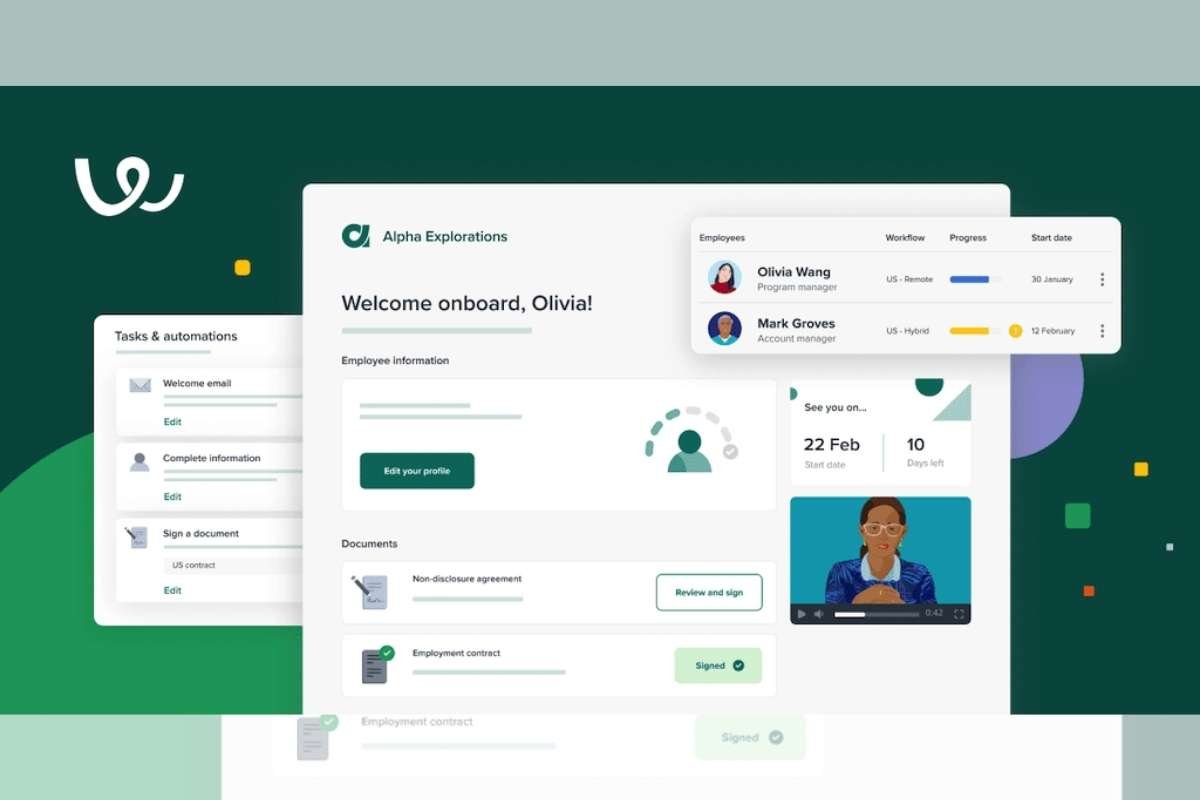
Workable is one of the focused and best recruiting CRM software. It is renowned for its clean UX and robust job posting capabilities. It integrates AI candidate recommendations. And offers task automation, multiple integrations, and customizable career pages.
- Benefits: Streamlined and well-designed interface. Wide job board reach, AI-powered candidate suggestions, and strong integrations.
- Limitations: Pricing transparency is limited; it lacks reference checking or advanced onboarding features.
- Best for: Organizations that want a reliable, well-designed recruitment toolkit without unnecessary complexity.
- Key Features: Job board integrations, drag-and-drop pipeline. With AI candidate recommendations, automation, integrations, and assessment tools.
- Pricing Tier: Not publicly transparent—requires contacting Workable for customized quotes.
6. SeekOut
SeekOut is an AI-powered talent intelligence platform. Offering access to hundreds of millions of candidate profiles. With advanced search, diversity hiring tools, and personalized outreach. It’s designed to transform sourcing through agentic AI capabilities.
- Benefits: Enables recruiters to search across expansive public and internal profiles. It uses rich filtering (including diversity-focused filters) and automates outreach with AI.
- Limitations: Pricing is not transparent and varies by account. Some users report information overload from search results or inaccuracies in candidate profiles.
- Best for: Mid-sized to large enterprises and talent acquisition teams. It is focused on diversity and sourcing specialists needing powerful AI tools.
- Key Features: AI-powered Boolean and chatbot-style search, advanced filters, diversity filters, and outreach automation. Integration with ATS/CRM and managed recruiter service (SeekOut Spot).
- Pricing Tier: Varies widely; reported ranges:
- Basic: ~$200/month
- Professional: ~$6,000/year
- Enterprise: ~$1,200/month
- Custom pricing based on features and scale
7. Bullhorn
Bullhorn is a widely used cloud-based CRM and ATS platform. It is tailored for staffing firms. Offering automation, integrated front- and back-office tools, and AI functionalities to boost placements.
- Benefits: Automates workflows across the recruiting lifecycle. Sourcing, tracking, timesheets, invoicing. With AI support and strong integration capabilities. Trusted by 10,000+ staffing firms.
- Limitations: They can be expensive, learning curve for complex features. The UI feels dated to some users, and support can be inconsistent.
- Best for: Small to medium staffing agencies requiring full-cycle staffing automation, plus enterprise clients needing advanced CRM and financial tools.
- Key Features: Small to medium staffing agencies requiring full-cycle staffing automation. Plus, enterprise clients need advanced CRM and financial tools.
- Pricing Tier: Estimated range:
- Starting around $99/user/month (Basic)
- $110–$315/user/month depending on tier and features
- Enterprise/custom plans available
8. Ceipal
Ceipal is an AI-infused staffing and best recruiting CRM software. It is combined with ATS, CRM, VMS, and workforce management capabilities. For offering a single, scalable solution designed for staffing agencies and enterprises.
- Benefits: It offers deep automation and centralization. With streamlining job posting, candidate sourcing, parsing, and placement. It is coupled with AI-driven matching and flexible workflows.
- Limitations: The Interface can feel cluttered. The reporting customization is limited. Resume parsing may require manual fixes. Fewer third-party integrations with the mobile app are less strong.
- Best for: Staffing agencies, large enterprises, and sectors like IT and healthcare. Seeking an all-encompassing recruitment platform.
- Key Features: ATS & CRM, automated workflows, AI-powered sourcing. And matching, timesheets/invoicing, VMS integration, reporting, front and middle office tools.
- Pricing Tier:
- ATS plan: starts around $24/user/month (5-user minimum)
- Workforce (with advanced features): starts around $100/month
- Custom pricing depending on features and scale
9. Recruiterflow
Description:
Recruiterflow is a sleek, modern recruitment CRM and ATS. This streamlines hiring with features. Such drag-and-drop pipelines, email sequencing, candidate sourcing through a Chrome extension, and real-time analytics. Its integrated approach helps recruiters stay organized and efficient.
- Benefits: Powerful automation capabilities (email sequences, reminders). With strong candidate sourcing and excellent pipeline visualization with analytics dashboards.
- Limitations: Limited third-party integrations. A slightly steep learning curve for new users. And reporting features could be more extensive.
- Best for: Small to mid-sized recruitment agencies. And teams focused on scaling efficiency through automation.
- Key Features: ATS CRM, Chrome sourcing extension, email/calendar sync, job board distribution. With branded career pages, workflows, automation recipes, analytics, reporting, and a mobile-responsive interface.
- Pricing Tier:
- Growth (Base): ~$99/user/month
- Scale (Pro): ~$109/user/month
- Enterprise (Advanced): ~$129/user/month
All plans include a 14-day free trial.
10. Paylocity
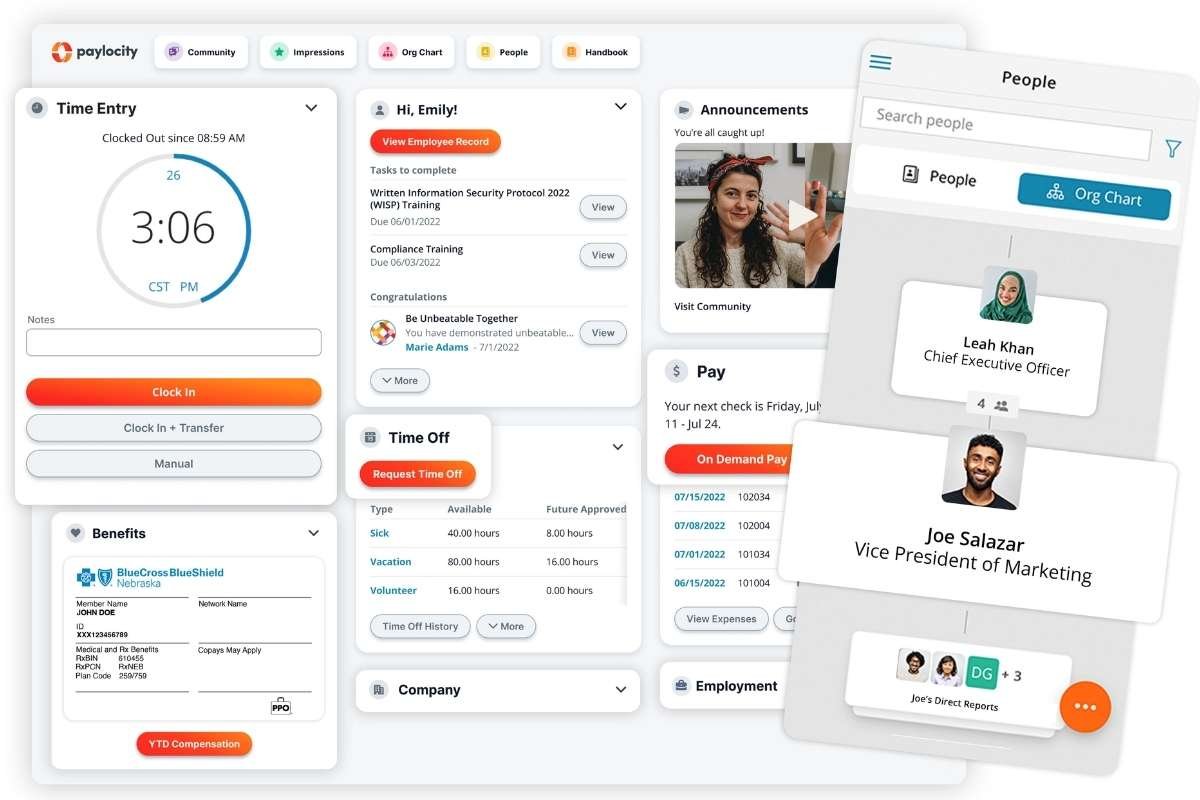
Paylocity is a comprehensive cloud-based HCM platform. It offers modules for payroll, HR, time & labor. With recruiting, onboarding, and performance management.
- Benefits: A fully integrated HCM system. This covers recruiting and the continued employee lifecycle in one platform. Scalable for mid-to-large organizations.
- Limitations: As a broad HCM suite. It may lack the specialized recruiting CRM depth that dedicated platforms provide. Pricing and recruiting module specifics require direct consultation.
- Best for: Organizations seeking unified HR, payroll. And recruiting functionality in a single, enterprise-ready platform.
- Key Features: Recruiting, onboarding, payroll, time & labor. With performance, compensation management is within a unified HCM system.
- Pricing Tier: Not publicly listed; pricing is likely custom per organization.
11. Salesforce (Recruiting CRM / Agentforce)
Salesforce delivers the best recruiting CRM software solution. They are powered by their Agentforce architecture. This automates candidate and client engagement. It matches talent intelligently and scales workflows across multiple channels with AI-driven insights.
- Benefits: World-class CRM infrastructure, AI-powered candidate matching, and journeys. Offers omnichannel communication, deep insights via Data Cloud and Tableau, and unmatched scalability.
- Limitations: Implementation complexity and cost may be high, especially for SMBs. Tailored setup and custom quotes are required.
- Best for: Large staffing firms or enterprises needing enterprise-grade CRM and recruitment automation. With heavy analytics and omnichannel capabilities.
- Key Features: AI agents (Agentforce), multichannel messaging, and candidate/client journey orchestration. With real-time insights, rich profile segmentation, and an integrated Salesforce ecosystem.
- Pricing Tier: Starts at around $25 per user/month for the Starter Suite. The higher tiers require custom quotes.
12. Quickbase
Quickbase is a low-code platform allowing organizations to build custom applications. Including recruiting workflows, CRM features, and applicant tracking, without extensive development.
- Benefits: Highly customizable; build tailored workflows and dashboards as needed.
- Limitations: It requires effort to design recruiting apps. It is not a ready-made recruiting CRM out of the box.
- Best for: Organizations needing a highly tailored recruitment process. Or integrating recruiting into broader operational workflows.
- Key Features: Low-code app building, customizable pipelines, integrations, and workflow automation.
- Pricing Tier: Custom pricing based on app development and usage—requires contacting sales.
13. Thryv
Thryv is an all-in-one marketing, CRM, and business-management SaaS platform. It aims at small businesses. It offers tools for online presence, CRM, scheduling, marketing automation, and client nurturing.
- Benefits: Consolidates marketing, CRM, scheduling, referrals, and reviews management in a single platform. It is well-suited for general small-business operations.
- Limitations: Numerous user reports cite poor customer service. With difficulty cancelling, unreliable software features, and overpromised capabilities.
- Best for: Small businesses looking for a unified tool. But only if due diligence is conducted. Enterprise-grade recruitment features are limited.
- Key Features: Website builder, CRM, social, and SEO management. With pipeline, scheduling, automated campaigns, and payment automation.
- Pricing Tier: Not transparent; users report tiered pricing with extra fees. Not recommended without caution.
14. Capsule CRM
Capsule is a lightweight, intuitive CRM. It has a tailored version for recruitment agencies. It helps enable candidate and client pipeline management, project tracking, and workflow automation.
- Benefits: Simple and clean interface, mobile and offline access. It has customizable pipelines, excellent for client and candidate engagement.
- Limitations: Lacks recruiting-specific features. Such as resume parsing, job board integrations, and automation for candidate sourcing.
- Best for: Small recruitment agencies or independent recruiters. Those who are seeking a basic CRM to manage candidate/client interactions.
- Key Features: Customizable pipelines for candidates/clients. It has notes & documents, reminders & automation, mobile/offline access.
- Pricing Tier: It offers a free trial; pricing not stated here—requires checking Capsule’s site.
15. SmartDreamers
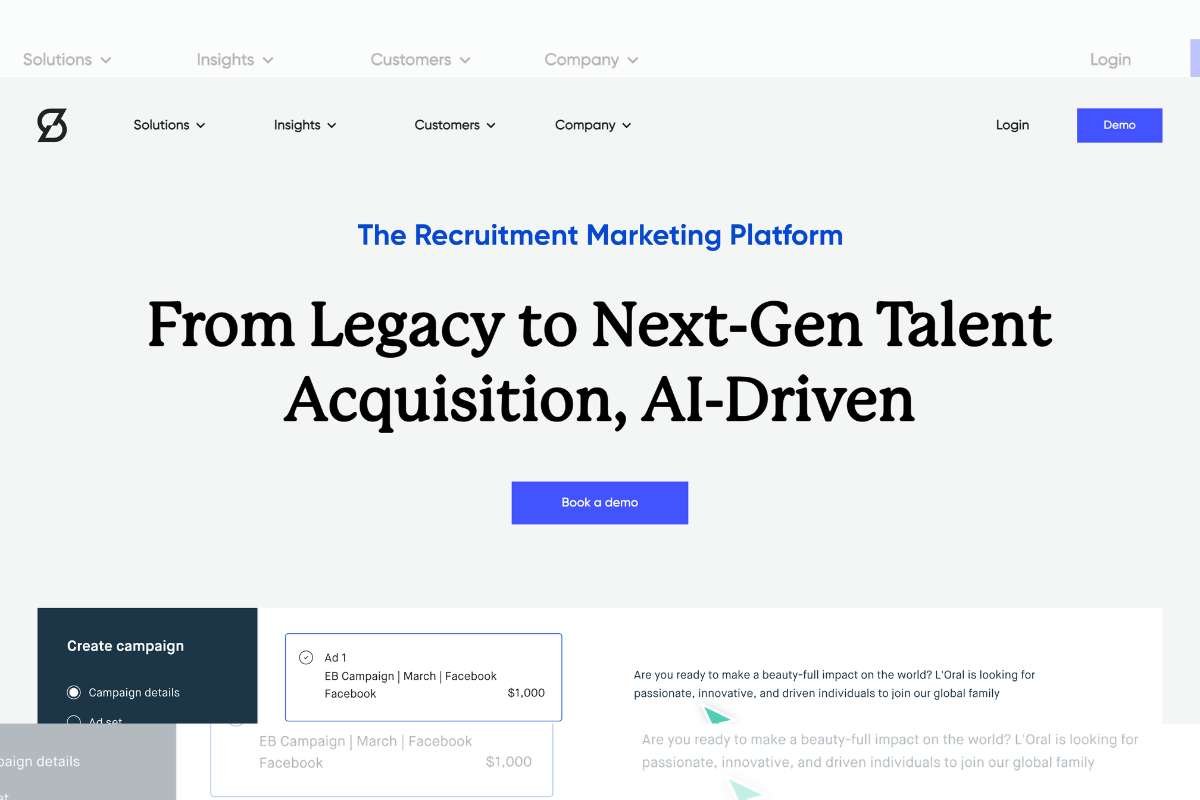
SmartDreamers is a recruitment marketing automation platform. It is designed to streamline employer branding and talent acquisition campaigns. It helps businesses attract, engage, and nurture candidates through data-driven marketing.
- Benefits: Strong recruitment marketing focus, integrates with ATS/CRM, enhances employer brand visibility.
- Limitations: Limited core applicant tracking features; pricing may be high for small teams.
- Best for: Companies prioritizing employer branding and candidate engagement.
- Key Features: Social media recruitment campaigns, career site optimization, analytics, and marketing automation.
- Pricing Tier: Custom pricing on request.
Also Read:
- Streamlining Success: The Power of Project Management Software
- Transforming Enterprises: The Power of AI Tools for Business Success
- The Enterprise Powerhouse: A Comprehensive Guide to Enterprise Resource Planning (ERP)
16. Symphony Talent
Symphony Talent offers a strong talent acquisition suite powered by AI. It is automation to improve candidate experiences and recruiter efficiency. These advanced functionality makes it the best recruiting CRM software for seamless hiring.
- Benefits: AI-driven candidate matching, omnichannel recruitment campaigns, and strong analytics.
- Limitations: Complex setup; best suited for large enterprises.
- Best for: Enterprise organizations with high-volume hiring.
- Key Features: AI recruiting assistant, personalized candidate journeys. With CRM + ATS integration, employer branding tools.
- Pricing Tier: Enterprise-level, custom pricing.
17. Gem
Gem is a modern recruiting CRM built for data-driven teams. It enables talent sourcing, nurturing, and pipeline management with advanced analytics.
- Benefits: Excellent pipeline tracking and powerful sourcing tools. It has integration with LinkedIn and the ATS platform.
- Limitations: Steeper learning curve for new recruiters; pricing is higher than basic CRMs.
- Best for: Fast-scaling companies and data-driven recruitment teams.
- Key Features: Outreach automation, pipeline analytics, candidate relationship tracking, and diversity reporting.
- Pricing Tier: Premium pricing; available upon request.
18. Remote
Remote provides global HR, payroll, and recruiting solutions. It helps businesses hire, onboard, and manage employees anywhere in the world.
- Benefits: Simplifies international hiring, compliance-focused, strong payroll and benefits management.
- Limitations: Less feature-rich in candidate sourcing compared to pure CRMs.
- Best for: Companies expanding globally and hiring remote talent.
- Key Features: Global payroll, compliance management, benefits administration, and international hiring support.
- Pricing Tier: Starts at $29 per employee/month. The contractor management and EOR pricing vary.
19. Workzoom
Workzoom is an all-in-one workforce management and recruiting software. It offers applicant tracking, HR, payroll, and performance management.
- Benefits: End-to-end HR management in one platform. It is scalable for mid-sized businesses and has customizable modules.
- Limitations: The Interface may feel less modern, with limited marketplace integrations.
- Best for: Mid-sized companies needing an all-in-one HR + recruiting solution.
- Key Features: Applicant tracking, onboarding, HR analytics, payroll, performance reviews.
- Pricing Tier: Custom pricing; scalable packages.
20. Crelate
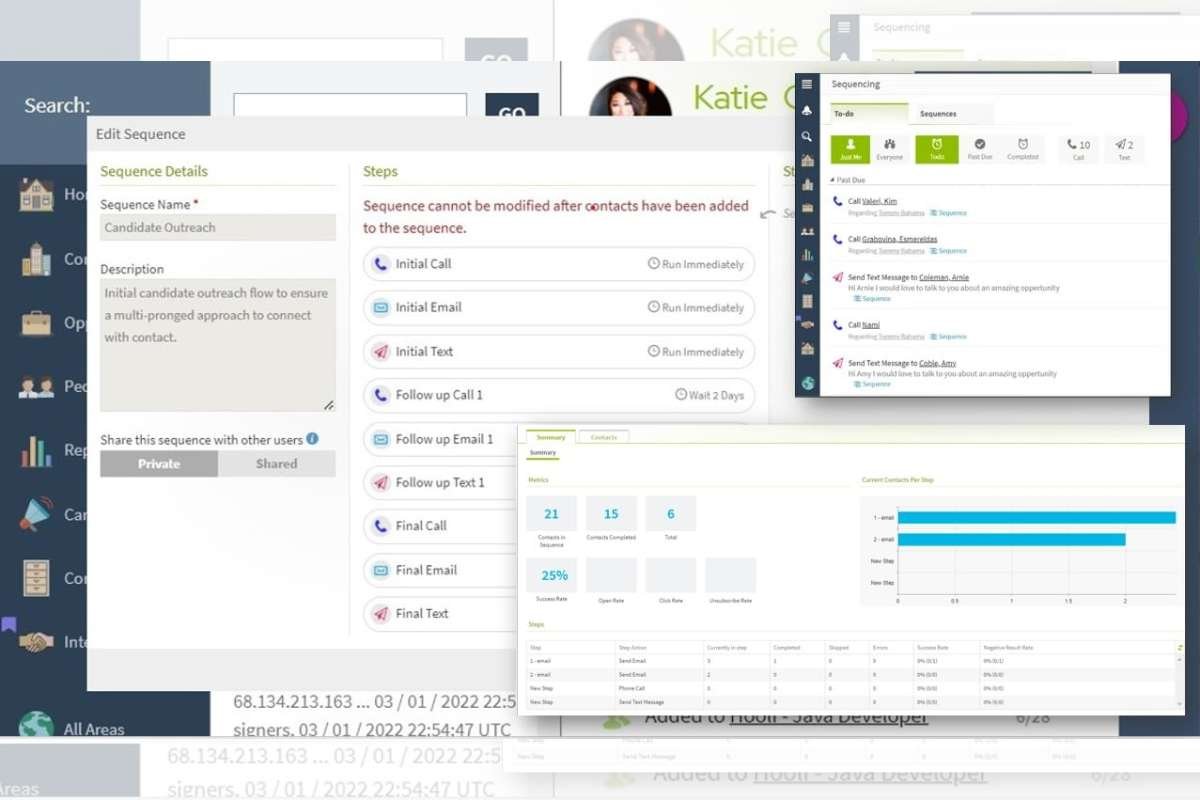
Crelate is a recruiting CRM and applicant tracking system. It is designed for staffing and recruiting agencies. It also offers flexibility and strong candidate management.
- Benefits: Easy-to-use, customizable workflows, excellent for agencies managing high candidate volumes.
- Limitations: Reporting features could be more advanced. The mobile app could be less intuitive.
- Best for: Staffing firms, executive search firms, and recruiting agencies.
- Key Features: Candidate pipeline tracking, client management, integrations, reporting, and job posting.
- Pricing Tier: Starts at around $69 per user/month.
21. HR Partner
HR Partner is an easy-to-use HR and best recruiting CRM software. It is designed for small to mid-sized businesses. It combines applicant tracking with HR functions. Such as leave management, performance reviews, and employee data storage.
- Benefits: Intuitive interface, affordable, covers both HR and recruiting needs. It is great for small teams.
- Limitations: Not as feature-rich for high-volume recruiting; fewer integrations compared to enterprise CRMs.
- Best for: Small to mid-sized businesses looking for a simple HR + recruiting solution.
- Key Features: Applicant tracking, onboarding, employee database, leave management, performance reviews.
- Pricing Tier: Starts at $49/month for small businesses.
22. Vincere
Vincere is a modern, all-in-one best recruiting CRM software and ATS. This is tailored for recruitment agencies. With end-to-end tools for managing candidates, clients, and job placements.
- Benefits: Excellent pipeline visibility, automation features, strong reporting, and analytics.
- Limitations: Can feel complex for small teams; higher pricing than entry-level tools.
- Best for: Recruitment agencies and staffing firms scaling operations.
- Key Features: Candidate pipeline CRM, client management, and marketing automation. With AI-driven matching and analytics dashboards.
- Pricing Tier: Starts at around $100/user/month.
23. JobAdder
JobAdder is a cloud-based recruitment CRM and ATS designed to simplify hiring workflows. With the help of strong integrations and automation features.
- Benefits: User-friendly interface, customizable workflows, and integrates with over 200 job boards.
- Limitations: Reporting could be more advanced; customer support response time varies.
- Best for: In-house recruitment teams and staffing agencies.
- Key Features: Job posting, resume parsing, pipeline management, AI candidate matching, and integrations.
- Pricing Tier: Starts around $99/user/month.
24. Lever
Lever is a collaborative and best recruiting CRM software and ATS. It enables organizations to nurture candidates, track pipelines, and improve diversity hiring.
- Benefits: Collaborative hiring workflows, excellent diversity recruiting tools, and clean UI.
- Limitations: Customization is somewhat limited; reporting can require training.
- Best for: Mid-sized to large businesses focusing on diversity and structured hiring.
- Key Features: Candidate CRM, ATS, interview scheduling, diversity analytics, automation.
- Pricing Tier: Custom pricing; mid-market to enterprise level.
25. PCRecruiter
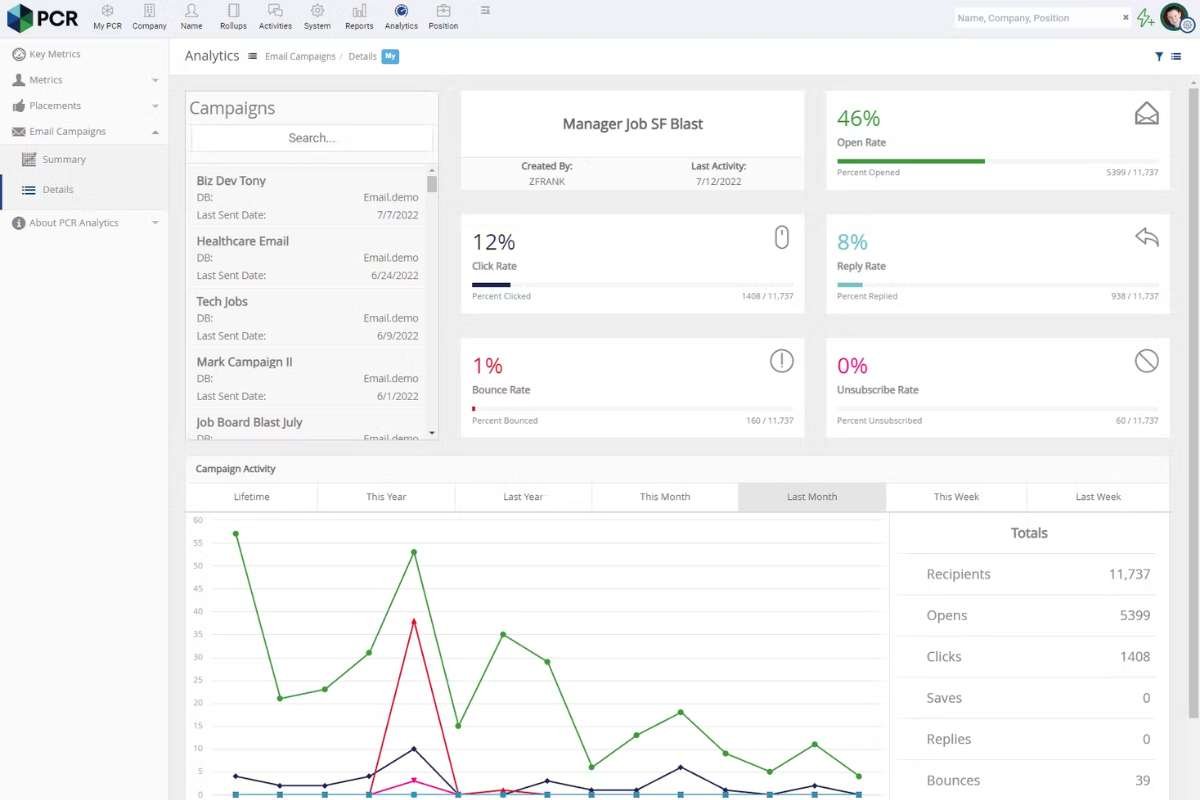
PCRecruiter is a long-standing recruiting CRM and ATS. It is trusted by staffing agencies and executive search firms. Because of its flexibility and customizability.
- Benefits: Highly configurable, strong integration ecosystem, long track record of reliability.
- Limitations: The Interface can feel outdated compared to newer platforms. It is a learning curve for new users.
- Best for: Staffing agencies, executive recruiters, and firms needing tailored workflows.
- Key Features: Candidate tracking, client/candidate CRM, email campaigns, reporting, and API integrations.
- Pricing Tier: Starts at around $85/user/month.
26. Recruitee
Recruitee is a collaborative recruitment CRM and ATS. This helps companies streamline hiring with job board posting, pipelines, and candidate nurturing. It emphasizes teamwork and structured workflows.
- Benefits: Easy-to-use UI, great for collaboration, affordable compared to enterprise CRMs.
- Limitations: Limited advanced reporting; some features locked in higher tiers.
- Best for: Growing businesses and startups needing affordable, team-friendly recruiting.
- Key Features: Job posting, drag-and-drop pipelines, team collaboration, referrals, and careers site builder.
- Pricing Tier: Starts at $199/month for teams (flat pricing, not per user).
27. Tracker
Tracker is a recruitment CRM and ATS. It is built specifically for staffing and recruiting agencies. It also helps in combining candidate management, sales CRM, and onboarding.
- Benefits: End-to-end platform (recruitment + sales CRM), strong automation, good customer support.
- Limitations: Can be overwhelming for smaller teams; reporting requires customization.
- Best for: Staffing agencies and firms needing combined recruiting + client management.
- Key Features: Candidate pipeline CRM, sales CRM, onboarding, analytics, automation.
- Pricing Tier: Starts at around $80/user/month.
28. TalentLyft
TalentLyft is a modern recruiting CRM and marketing platform. It has strong candidate engagement and employer branding features.
- Benefits: Excellent for employer branding, strong recruitment marketing tools, and affordable for SMBs.
- Limitations: Limited customization in workflows; fewer integrations than top-tier CRMs.
- Best for: Companies prioritizing employer branding and candidate experience.
- Key Features: CRM, ATS, talent pool management, recruitment marketing, and branded career sites.
- Pricing Tier: Starts at $99/month.
29. Pipedrive
Pipedrive is a popular sales CRM that many recruiters adopt as a recruiting CRM. Due to its pipeline-style interface and automation features.
- Benefits: Extremely visual pipelines, affordable, and easy automation setup.
- Limitations: Not purpose-built for recruiting; lacks HR-native features like resume parsing.
- Best for: Small recruiting teams and agencies that want a simple, low-cost CRM.
- Key Features: Customizable pipelines, email tracking, automation, reporting, and integrations.
- Pricing Tier: Starts at $14.90/user/month.
30. Freshteam (by Freshworks)
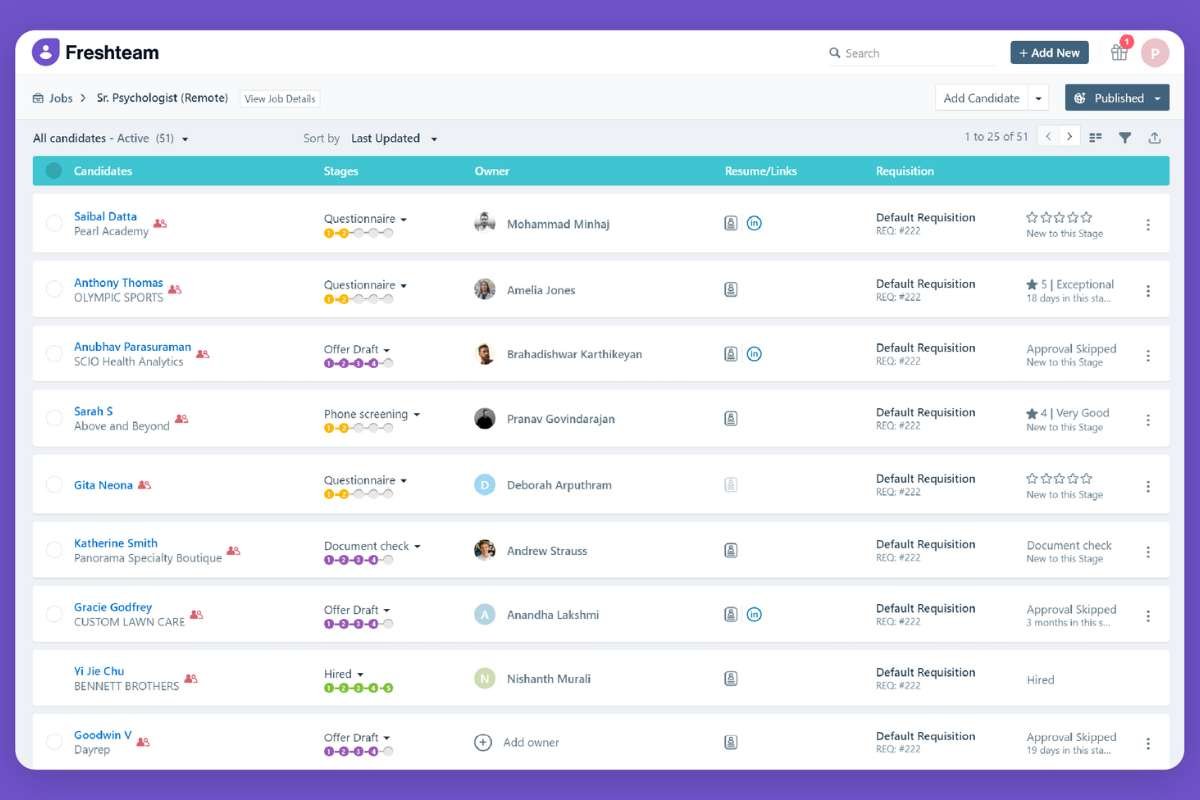
Freshteam is the best recruiting CRM software and ATS. It’s designed for SMBs, offering applicant tracking, employee onboarding, and HR management tools.
- Benefits: Easy-to-use, budget-friendly, and integrates with the Freshworks ecosystem.
- Limitations: Limited scalability for enterprise-level hiring; reporting is basic.
- Best for: Startups and SMBs looking for affordable recruiting + HR in one tool.
- Key Features: ATS, employee onboarding, HR database, leave management, and integrations.
- Pricing Tier: Free plan for up to 50 employees; paid plans start at $1/user/month.
Also Read:
- Unlock Smarter Hiring: Choosing the Best Recruiting Software for Your Team
- 6 Best HR Software for Small Businesses to Simplify Operations
Conclusion
The choice of for best recruiting CRM software is a vital decision. This can shape your hiring success for years to come. The right platform goes beyond just data management. Changing your hiring from a reactive chore into a strategic, proactive advantage. By using the power of automation, analytics, and personalized candidate engagement. You can attract, nurture, and hire the talent. These talents will drive your organization forward. The future of recruitment is here. And it’s built on a foundation of strong relationships with the help of the best recruiting CRM software. Are you ready to start building yours?
FAQs:
1. What is Recruiting CRM Software, and how is it different from an ATS?
Recruiting CRM software focuses on building long-term relationships with candidates. With the help of engagement, talent pooling, and nurturing. An ATS (Applicant Tracking System) mainly manages applications for open jobs. Many modern solutions combine both to give recruiters a complete toolkit.
2. Which is better for small businesses – ATS or Recruiting CRM?
Small businesses benefit more from a recruiting CRM that integrates ATS capabilities. This way, they can manage the current hiring needs of the company. While building candidate pools for future roles, without investing in multiple tools.
3. Can recruiting CRM software improve diversity hiring?
Yes. Many leading solutions now offer AI-powered sourcing and blind recruitment tools. With analytics dashboards to reduce bias and promote inclusive hiring. For example, platforms like SeekOut and Gem are particularly strong in this area.

